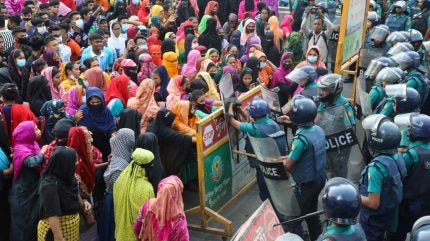
The 48,000 cases were originally lodged during demonstrations that broke out after the announcement of a new minimum wage, which workers said fell short of union demands of BDT 23,000 ($196) per month.
The protests, which took place under the former Hasina administration, led to violent clashes in which four workers were reportedly killed, dozens were injured, and more than 130 were arrested.

Discover B2B Marketing That Performs
Combine business intelligence and editorial excellence to reach engaged professionals across 36 leading media platforms.
Labour organisations, including Clean Clothes Campaign (CCC), Worker Rights Consortium and Solidarity Center, alleged that the mass criminal charges were used to discourage collective action in the garment sector. The groups claimed many of the cases were filed without evidence, with factory owners able to accuse thousands of workers through a single complaint.
“This is a massive victory for workers in Bangladesh, for trade unions anywhere in the world and for international solidarity”, said Kalpona Akter, a trade union leader from Bangladesh. “It shows the strength of workers, of organising and of international solidarity work.”
According to CCC, more than 40 international brands were linked to suppliers involved in filing the cases with charges ranging from vandalism to assault or even murder.

US Tariffs are shifting - will you react or anticipate?
Don’t let policy changes catch you off guard. Stay proactive with real-time data and expert analysis.
By GlobalDataFollowing the fall of the Hasina government, local trade unions within the CCC network said they were able to work with the interim administration to secure the withdrawal of all remaining cases.
Anne Bienias of the Clean Clothes Campaign said the decision marked the result of years of advocacy by workers, trade unions and labour rights groups.
She added: “After almost two years of fighting, 48,000 workers and families can breathe a sigh of relief knowing that they won’t be facing prosecution for exercising their legal right to protest”.
Trade unions are now in talks with the interim government on wider labour law reforms, including stronger protections for the right to organise, the right to strike, and a more transparent wage-setting process.
The reforms are expected to align with ongoing calls for fair pricing and responsible purchasing practices by international fashion brands sourcing from Bangladesh.
The Bangladesh Garment Manufacturers and Exporters Association (BGMEA) had not responded to Just Style’s request for comment at the time of going to press.





